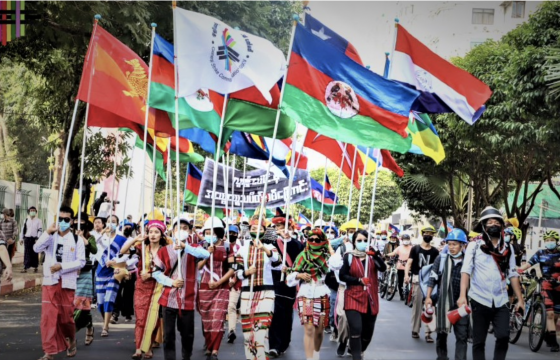The number of No-Vote areas in the 2020 General Election hits a record number compared to the numbers in the previous elections and deals a bitter blow to the chances of ethnic parties.
A major row has erupted over the Union Election Commission's (UEC) decision to exclude a record number of ethnic constituencies from the election, causing ethnic parties to file a complaint that the voting rights of 1.5 million people in Karen, Mon, Kachin, Shan and Rakhine States have been unfairly erased by the stroke of a UEC pen.
Over 1.3 voters have been excluded from exercising their democratic rights across six ethnic states by the UEC’s October 16th delineation of “No-Vote” zones. There are 15 skipped constituencies, 23 wards and 558 village-tracts in total, far more than in the 2015 election.
Five ethnic parties have complained to the UEC, and decried the election commission’s arrogance and bias towards ethnic peoples’ rights. In a joint statement they declared “Being free and fair is the most important characteristic of the election. The UEC’s impartiality, transparency, integrity and fairness in organizing the 2020 General Election has been called into question...” issued by: The Kachin State People’s Party, the Kayah State Democratic Party, the Karen National Democratic Party, the Chin National League for Democracy and the Mon Unity Party October 18th).
The Union Election Commission (UEC) said they will now review the list of the excluded areas banned from the election. In a press conference on October 20th, they denied the charge of bias and claimed their rulings are only based on security but they added d” The UEC does not make its decisions alone.” The other parties to UEC rulings were named as the Ministries of Defense and Home Affairs, and the General Administration Department (GAD). .These three pillars of military control inside the cabinet have a long history of hostility to the aspirations of ethnic parties.
It was expected that some areas with ongoing military conflicts especially in Rakhine State would be declared unsafe for legitimate security reasons. What has caused widespread dismay is that under the pretext of safety and security, relatively peaceful areas have also been denied voting rights and strangely added to the list of dangerous zones engaged in fighting between armed groups.
One example is the exclusion of Mong Kung Township in Shan State, won by the Shan Nationalities League for Democracy (SNLD) won in the 2015 election. Locals say after fighting in February.
“We are getting ready to hold the election on the ground. The polling stations are all in place,” said Zaw Myint Win, secretary of Shan State Election Commission, who said the decision to cancel voting in some townships was totally unexpected” RFA reported. “There is no problem on the ground. The candidates are campaigning extensively in the townships. We were getting ready to hold the election.”
Sai Nyunt Lwin, the vice-chairman of the Shan Nationalities League for Democracy, a popular party among ethnic Shan, wondered why the UEC made such a decision in Mong Kung, where there are no security concerns or health-care emergencies unlike in Yangon, the country’s COVID-19 hotspot.
Htin Kyaw, chairman of the Shan state election commission, said nearly 100,000 voters lost their voting rights under the decisions announced for the 2020 election.
Another Shan politician Nyi Sein, Chair of the Ta’ang National Party (TNP) based in Shan State told BNI: “There will only be freedom when there is fairness. But now there is no fairness. I think if there is no fairness, there is no freedom. The big parties from the lowlands still persecute the ethnic parties.”
“The NLD and the USDP may now be able to secure seats in the constituencies where the ethnic parties are strong” according to observations posted on Facebook by former information minister U Ye Htut.
According to the recent press conference by the Arakan election monitoring group, around 1.3 million out of over 1.6 million eligible voters will lose their voting rights in Arakan State as the election is skipped in nine townships and 15 wards and 137 village-tracts in four townships.
“There are only 35 seats for elected MPs in Rakhine State parliament and 20 of them will be vacant. So the upcoming parliament will not be representative of Rakhine people,” said Kyaw Hsan Naing from the Rakhine state election watch group told RFA.
Overall the sheer number of allegedly dodgy “No-Vote” exclusions could have a huge impact on the election results leading to a grossly distorted picture of NLD support relative to their ethnic-based rivals.
Another impact of what is widely perceived to be an election process that marginalizes ethnic voters and parties cited by the five ethnic parties on 18 October, “the UEC’s statement may push ethnics to choose a path of free expression and activism outside parliamentary politics.” Unless the UEC undertakes major revisions, national reconciliation will be undermined and allegiance to the union eroded.
Ever since the Panglong Agreement was signed in 1947 which provided the framework for equality of all ethnic groups and a mutually agreed Union of Burma, ethnic parties have been striving to persuade the Bamar (Lowland Burmese) majority to implement equal respect for the
ethnic minorities in accord with the spirit of Panglong.
But this controversial UEC ruling seems to embody the domination of the Bamar elite, their indifference to fair representation of the ethnic states. Ethnic parties are the hardest hit by the exclusions. UEC has eliminated 15 seats of the lower house and seven seats of the upper house in areas where the ethnic parties are strong and secured most of the seats in 2015.It means that after the 2020 election the representation of ethnic–based parties will almost certainly be drastically reduced in both the national and the state parliament.
The UEC under critical scrutiny
What is the motive behind the UEC’s inclusion of relatively safe and stable areas in Shan, Kachin, and Karen? Mon and Bago regions is the question posed by the five ethnic parties who jointly filed the complaint?
There is an urgent need for the UEC to review the blacklist of no-vote constituencies for the purpose of ethnic reconciliation and to explain the reason to the political parties and the public.
The Union Election Commission (UEC) announced on October 20th they would review the lists of skipped areas and that UEC would seek comments from the Ministry of Defence, the Ministry of Home Affairs, the Ministry of Union Government Office and relevant election sub-commissions, to know whether or not there is safety for all people involved in the voting process.
U Myint Naing, a member of the UEC, at a press conference on the 20th said “we will hold the election in the areas excluded from the lists if the areas seem safe. Currently, the UEC is reviewing the situations in Ann and Paletwa Townships.
On October 16, the UEC released the lists of skipped constituencies for the 2020 General Election.
There are 15 skipped constituencies, 23 wards and 558 village-tracts in total: 192 village-tracts in 11 townships in Kachin State, 53 village-tracts in six townships in Karen State, one village-tract in one township of Mon State, 42 village-tracts in two townships in Bago Region, nine townships, 15 wards and 137 village-tracts in four townships in Arakan State, six townships, eight wards and 133 village-tracts in 17 townships in Shan State. The UEC said it is assuming that there will be no free and fair elections there.
However political analyst Maung Maung Soe noted” In 2015, the decision was representative. They held discussions prior to cancelations in the elections in 2015. They invited all political parties, government ministries and department heads to a workshop to decide whether to cancel the election. But in 2020 the UEC made the decision alone. They mainly gave the excuse that the military and home affairs ministry cannot guarantee safety during the election, but they didn’t give detailed information on why they had to cancel,” RFA reported
The ethnic parties say the UEC has to go back to the 2015 exclusions and consult with all parties in the area – local officials, local parties to reconsider whether the major increase of cancelled elections is really justified. Only a very transparent review and major changes f restore ethnic parties faith in the integrity of elections and rescue the 2020 election from a legacy of distrust that is already rife among one third or more out of Myanmar’s 37 million voters.






